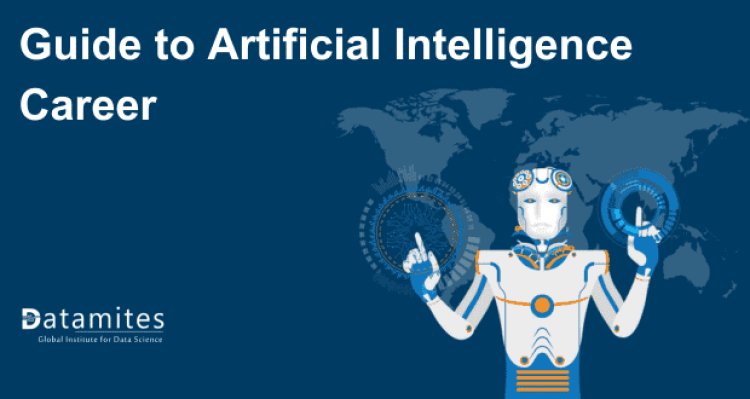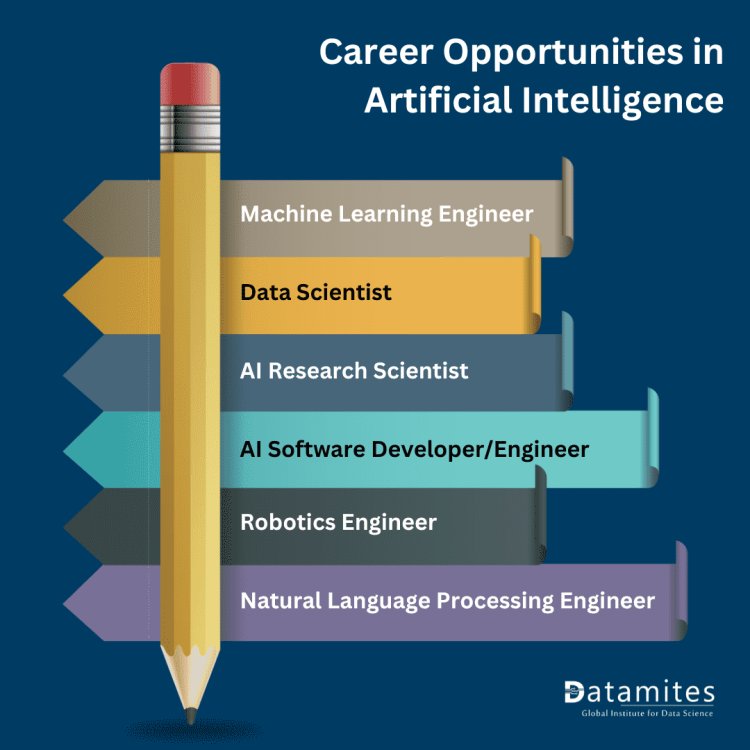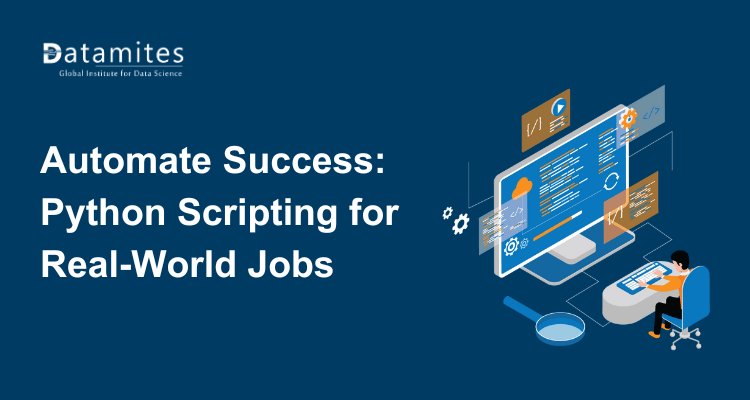Guide to Artificial Intelligence Career
Explore the vast opportunities in the Artificial Intelligence (AI) field with a comprehensive guide to building a successful career. Learn key skills, career paths, and essential strategies for thriving in this rapidly evolving industry.

Artificial Intelligence (AI) is rapidly transforming industries, making it one of the most exciting and sought-after fields for aspiring professionals. With AI's potential to revolutionize everything from healthcare to finance, a career in AI offers immense opportunities for those with the right skills and passion.
According to a report from Allied Market Research, the Artificial Intelligence market is expected to reach a significant value of $1,581.70 billion by the year 2030, driven by a remarkable compound annual growth rate (CAGR) of 38.0%.
In this comprehensive guide, we will explore the various aspects of building a successful career in Artificial Intelligence, from education and skill development to job prospects and industry trends.
Artificial Intelligence: Shaping the Future of Technology and Society
Artificial Intelligence (AI) has witnessed an unprecedented surge in popularity and advancement in recent years. Its meteoric rise can be attributed to the convergence of powerful computational capabilities, vast amounts of data, and breakthroughs in machine learning algorithms. AI technologies are being integrated into a wide array of applications, from autonomous vehicles and virtual assistants to healthcare diagnostics and financial services.
In the latest "Global Artificial Intelligence Market" report by Facts & Factors, a comprehensive analysis of the entire market is provided. The global AI market is set to witness significant growth, commencing with a market worth of $29.86 billion in 2020, driven by an impressive CAGR of 35.6%, and is projected to reach $299.64 billion by 2026.
This rapid growth is not only transforming industries but also reshaping the way we live and work, making AI one of the most dynamic and influential fields in the modern era. As AI continues to evolve, it holds the promise of solving complex problems, automating tasks, and enhancing decision-making, leaving an indelible mark on the future of technology and society.
Read These Articles:
- Artificial Intelligence Course Eligibility Criteria, Syllabus & Skills
- Artificial Intelligence vs Machine Learning
- What Is AI? Know Everything About Artificial Intelligence
AI Engineer: The Architect of Intelligent Systems
An Artificial Intelligence Engineer is a specialized expert tasked with conceptualizing, creating, and deploying AI systems and solutions.They possess a strong foundation in computer science, mathematics, and machine learning algorithms. AI engineers create and train machine learning models, optimize algorithms, and work on natural language processing, computer vision, and other AI domains.
They collaborate with cross-functional teams to solve complex problems and leverage AI to improve products, services, and decision-making processes across various industries. AI engineers play a crucial role in advancing the field of artificial intelligence and its applications.
The Unstoppable Rise of Artificial Intelligence: Meeting the Growing Demand
Artificial intelligence (AI) has seen a growing demand across various key industries, transforming the way businesses operate and improving efficiency. Here's an overview of how AI is impacting each of these sectors:
Healthcare:
- Diagnosis and treatment: AI-powered algorithms can analyze medical images (e.g., X-rays, MRIs) to assist radiologists in detecting diseases like cancer.
- Drug discovery: AI helps identify potential drug candidates by analyzing large datasets and predicting their efficacy.
- Personalised medicine: AI can analyze patient data to create tailored treatment plans and predict disease risks.
- Healthcare operations: AI optimizes hospital operations, scheduling, and resource allocation.
Finance:
- Fraud detection: AI algorithms can detect suspicious transactions and prevent fraudulent activities in real time.
- Risk assessment: AI models assess creditworthiness and determine lending risk for loans and investments.
- Algorithmic trading: AI-driven trading systems make split-second decisions to optimize investment portfolios.
- Customer service: Chatbots and virtual assistants enhance customer interactions and provide financial advice.
Retail:
- Personalized recommendations: AI analyzes customer behaviour and preferences to offer tailored product recommendations.
- Inventory management: AI helps retailers optimize stock levels, reducing overstock and understock situations.
- Supply chain optimization: AI enhances logistics, predicting demand, and improving delivery efficiency.
- Customer experience: Chatbots and AI-driven customer support improve service and resolve inquiries.
Education:
- Adaptive learning: AI systems personalize learning experiences, adjusting content and pace based on individual student progress.
- Administrative tasks: AI automates administrative tasks, such as grading and scheduling, allowing educators to focus on teaching.
- Student support: Chatbots offer on-demand assistance to students, answering questions and providing resources.
- Predictive analytics: AI can predict student performance and identify those who may need additional support.
Telecommunications:
- Network management: AI optimizes network performance, predicting and preventing outages and ensuring quality of service.
- Customer service: Chatbots assist customers with troubleshooting, account inquiries, and service customization.
- Predictive maintenance: AI analyzes data from network equipment to schedule maintenance and reduce downtime.
- Fraud prevention: AI identifies suspicious activities, such as SIM card fraud, protecting both telecom companies and customers.
Read These Articles:
- Data Science Career Scope in India
- Data Analyst Career Scope in India
- Python Programming Career Scope in India
Career Opportunities and Duties in Artificial Intelligence
AI (Artificial Intelligence) professionals are involved in various roles and responsibilities, depending on their specific job titles and the industry they work in. Here are some common AI jobs and their general responsibilities:
Machine Learning Engineer:
- Design and develop machine learning models.
- Implement algorithms and statistical models to enable a machine to perform specific tasks.
- Optimize the performance of models on large datasets.
Data Scientist:
- Examine and interpret intricate datasets to uncover patterns and valuable insights.
- Use machine learning and statistical methods to provide solutions to data-driven problems.
- Communicate findings to stakeholders.
AI Research Scientist:
- Research to advance the field of AI, developing new theories and techniques.
- Share research discoveries in scholarly publications and present them at conferences.
- Collaborate with engineering teams to apply research findings to real-world applications.
AI Software Developer/Engineer:
- Create systems capable of comprehending, interpreting, and interacting with human language.
- Implement AI algorithms and models into software systems.
- Work with cross-functional teams to integrate AI functionalities into broader systems.
Robotics Engineer:
- Design and develop robotic systems, which may include AI elements.
- Program and test robotic systems for desired functionalities.
- Troubleshoot and improve existing robotics and AI systems.
Natural Language Processing (NLP) Engineer:
- Design systems capable of comprehending, interpreting, and engaging with human language.
- Work on text analysis, speech recognition, and language generation.
- Improve the interaction between computers and humans through language.

Eligibility and Skill Requirements for Advanced Artificial Intelligence Roles
Eligibility and skill requirements for artificial intelligence (AI) roles can vary depending on the specific job, company, and IT industry. However, there are some common qualifications and skills that are typically sought after in AI-related positions. Here's a general overview:
Eligibility Requirements:
Educational Background:
Bachelor's, Master's, or Ph.D. in computer science, machine learning, artificial intelligence, data science, mathematics, or a related field.
Relevant coursework or certifications in AI and machine learning can also be considered.
Work Experience:
Entry-level AI roles may require no prior work experience, while senior positions typically require several years of experience.
Demonstrated experience in AI projects, research, or internships can be a significant advantage.
Programming Skills:
Mastery of programming languages frequently employed in AI, such as Python, Java, or C++.
Strong Analytical Skills:
Capability to dissect intricate datasets and derive significant insights.
Skill Requirements:
Machine Learning and Deep Learning:
Strong understanding of machine learning algorithms, techniques, and frameworks (e.g., TensorFlow, PyTorch).
Experience with neural networks, deep learning models, and their implementation.
Data Manipulation and Analysis:
Proficiency in data preprocessing, feature engineering, and data visualization.
Familiarity with data analysis libraries like NumPy, pandas, and Matplotlib.
Programming and Software Development:
Skill in crafting code that is clean, efficient, and easy to maintain.
Version control systems (e.g., Git) knowledge.
Data Science Tools:
Knowledge of data science tools like Jupyter Notebooks for experimentation and model development.
Natural Language Processing (NLP):
Understanding of NLP techniques for text analysis, sentiment analysis, and chatbots.
Computer Vision (if applicable):
Experience in computer vision for image and video analysis.
AI Frameworks:
Proficiency in using AI frameworks such as scikit-learn, Keras, or OpenAI's GPT (Generative Pre-trained Transformer).
Cloud Computing:
Familiarity with cloud platforms like AWS, Azure, or Google Cloud for scalable AI deployments.
Read These Articles:
- Artificial Intelligence Course Fee in Hyderabad
- Artificial Intelligence Course Fee in Pune
- Artificial Intelligence Course Fee in Chennai
- Artificial Intelligence Course Fee in Bangalore
- Artificial Intelligence Course Fee in India
Guide to Artificial Intelligence Career
The AI career path is both thrilling and full of promise, with increasing demand for AI professionals spanning diverse industries. Here's a step-by-step guide to help you build a successful career in AI:
Educational Foundation:
Start with a strong educational background. Most AI professionals have at least a bachelor's degree in computer science, mathematics, data science, or a related field. Consider pursuing a master's or PhD for more specialized roles or research positions.
Learn the Basics:
Gain a solid understanding of the fundamentals of AI, including machine learning, deep learning, natural language processing (NLP), and computer vision. Online courses, books, and tutorials can be valuable resources.
Programming Skills:
Develop proficiency in programming languages commonly used in AI, such as Python and R. Familiarize yourself with relevant libraries and frameworks like TensorFlow, PyTorch, scikit-learn, and Keras.
Mathematics and Statistics:
Deepen your knowledge of mathematics, particularly linear algebra, calculus, and probability theory. Strong math skills are crucial for understanding AI algorithms.
Hands-On Projects:
Apply your knowledge through practical projects. Create machine learning models, work on Kaggle competitions, and contribute to open-source AI projects. Building a portfolio of projects is essential to demonstrate your skills to potential employers.
Online Courses and Certifications:
Enroll in online courses and certification programs offered by various platforms. Popular courses like Machine Learning course or Deep Learning Specialization can be beneficial.
Stay Updated:
AI is a rapidly evolving field. Stay current with the latest research papers, blogs, and conferences (e.g., NeurIPS, CVPR, ICML) to keep up with the latest trends and breakthroughs.
Internships and Work Experience:
Seek internships or entry-level positions in AI-related roles to gain practical experience. Companies often hire interns or junior professionals to work on AI projects.
Interview Preparation:
Prepare for AI-related technical interviews, which often involve coding challenges, algorithmic problem-solving, and discussions about AI concepts—practice on platforms like LeetCode and HackerRank.
Specialize:
Identify a specific area within AI that interests you, such as computer vision, natural language processing, reinforcement learning, or robotics. Specializing can make you a sought-after expert in your chosen field.
Career Advancement:
As you gain experience, consider pursuing leadership roles, contributing to research, or starting your AI-related projects or companies.
Worldwide Artificial Intelligence Engineer salaries:
- The artificial intelligence engineer salary in the UK ranges from GBP 60,647 per year according to a Glassdoor report.
- The artificial intelligence engineer salary in USA ranges from USD 1,53,933 per year according to a Glassdoor report.
- The artificial intelligence engineer salary in Canada ranges from CAD 1,04,708 per year according to a Glassdoor report.
- The artificial intelligence engineer salary in Australia ranges from AUD 1,16,000 per year according to a Glassdoor report.
- The artificial intelligence engineer salary in South Africa ranges from ZAR7,62,835 per year according to a Glassdoor report.
- The artificial intelligence engineer salary in UAE ranges from AED 3,47,626 per year according to an Economic Research Institute report.
- The artificial intelligence engineer salary in Saudi Arabia ranges from SAR 2,46,031 per year according to an Economic Research Institute report.
- The artificial intelligence engineer salary in Switzerland ranges from CHF1,37,537 per year according to an Economic Research Institute report.
- The artificial intelligence engineer salary in India ranges from INR 11,60,909 per year according to a Glassdoor report.
- The artificial intelligence engineer salary in Germany ranges from EUR 93,247 per year according to an Economic Research Institute report.
Key Factors Affecting Salaries in the Artificial Intelligence Industry
Several factors can influence the salary of professionals working in artificial intelligence (AI). Here are some key points:
Experience: The level of experience and expertise in AI significantly impacts salary. More experienced AI professionals tend to command higher pay.
Education: A higher level of education, such as a master's or Ph.D. in AI or related fields, can lead to higher salaries.
Location: Salaries for AI professionals vary by geographic location, with major tech hubs like Silicon Valley offering higher compensation due to the higher cost of living.
Industry: The industry in which AI professionals work can affect their salaries. Industries like finance, healthcare, and tech often pay more for AI talent.
Company size: Larger companies, especially tech giants, typically offer higher salaries than smaller startups or organizations.
Skillset: Specialized Artificial Intelligence skills, such as deep learning or natural language processing, can lead to higher salaries as they are in high demand.
Certification: Having relevant Artificial Intelligence certifications can boost earning potential and demonstrate expertise to employers.
Demand for the role: Job roles in AI that are in high demand, such as machine learning engineer or data scientist, often come with higher salaries.
What is the future of artificial intelligence?
The future of artificial intelligence holds immense promise and potential. AI is expected to continue advancing, enabling more efficient automation, personalized experiences, and data-driven decision-making across various industries. Ethical considerations and responsible AI development will become increasingly important. Collaboration between humans and AI is likely to reshape work dynamics and drive innovation in the coming years.
Pursuing an artificial intelligence career offers exciting opportunities for individuals with a passion for innovation and problem-solving. The field is rapidly evolving, with a growing demand for AI professionals across diverse sectors. Continuous learning, adaptability, and a strong foundation in mathematics and programming are key to success in this dynamic field. As AI continues to transform industries, AI careers are poised to remain at the forefront of technological advancement for years to come, making it a compelling choice for aspiring professionals.
DataMites offers a globally recognized Artificial Intelligence course, backed by industry-accredited certification. Ranked alongside renowned institutions such as IIT and IIM, DataMites delivers premier AI training. The program covers advanced AI concepts, hands-on projects, and expert mentorship, empowering professionals with the skills needed to thrive in AI-driven industries.





